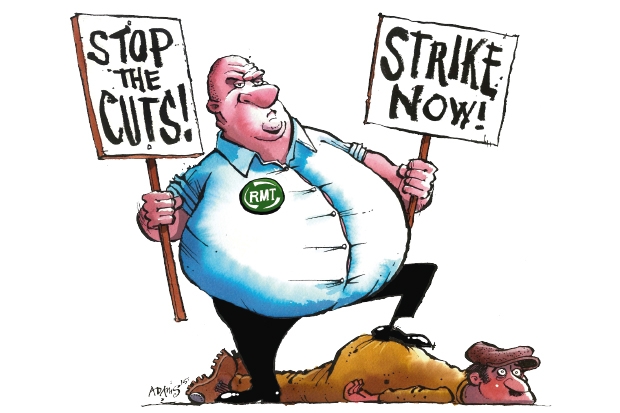The brothers are back. Few political groups have been more exhilarated by Jeremy Corbyn’s landslide victory than the trade unions. For years they have been regarded as the difficult relations of the Labour movement, useful mainly for their financial and organisational muscle but not much else. Blairite New Labour was openly hostile towards them, Ed Miliband equivocal. Indeed his decision to widen Labour’s voting membership, a move which dramatically assisted the Corbyn campaign, was a deliberate attempt to reduce the influence of the trade unions.
But now Labour is led by someone who enthusiastically shares their anti-capitalist, anti-austerity, reform-blocking, high-taxing, state-expanding ideology. In Corbyn, they now have a political soulmate at the top of the party that most of them bankroll. ‘You have to pinch yourself that a Labour leader is saying things that all of us agree with,’ says Mark Serwotka, head of the civil service union the PCS. For most British people, the late 1970s were dark days for Britain, with union militancy regularly paralysing the country. But the union bosses and Corbyn supporters yearn nostalgically for the return of that untrammelled power, when membership stood at over 13 million, more than double the total of today.
Corbyn himself began his political career as an official with the National Union of Public Employees – now part of the mighty Unison empire – during that period of turmoil in the 1970s. To this day, he retains his undiluted faith in the role of the unions at the head of Labour ‘s vanguard. ‘The Labour Party and the unions have got to remain linked forever,’ he declared in quasi-religious terms at his victory celebrations on Saturday. And he openly paid tribute to the unions, especially Len McCluskey’s Unite, for doing much of the heavy lifting on his campaign. ‘Unite have been fantastic,’ he said emotionally, having embraced McCluskey.
For the unions, this is all heady stuff. Corbyn’s election has been a massive shot of adrenalin, encouraging them to fantasise about massive protests and rolling strikes that could make it almost impossible for the Tories to govern. Typical of this euphoric outlook was the response of Rob Williams of the National Shops Stewards Network. ‘The victory yesterday by Jeremy Corbyn changes everything. The vote we saw yesterday was a political revolution. We must build a mass movement against austerity and against trade union laws. The message must be simple: “Cameron, we are going to take you down.”‘
Not only is this approach completely undemocratic, but it is also hopelessly deluded. Corbyn’s election does not represent a wider convulsion among the British public. It is just an emotional spasm from the left which is still in a state of embittered trauma over its heavy defeat in the general election. Far from joining in the unrest, most mainstream voters will be repelled by the threats of chaos from Corbyn and his union allies.
But gripped by their self-serving delusions, the unions are planning to use the Corbyn leadership to step up their anti-Tory campaign. The focus of their opposition will be the government’s Trade Union Bill, which is passing through Parliament at present and has its Second Reading in the Commons today. The proposed legislation requires higher thresholds for strike ballots, particularly in the essential public services, where industrial action will only be legal if supported by 40 per cent of the workforce on a 50 per cent turnout. The Bill also imposes restrictions on picketing and a four-month time limit on the validity of strike ballots, to ensure that unions have a proper mandate for their disruption, while in future trade union members will have to opt-in, rather than opt-out of contributing towards their political funds.
This is all perfectly sensible, the sort of programme of reform that would have been introduced years ago had the Liberal Democrats not blocked it during the coalition. Such a measure will make trade unions more accountable, their political funding more transparent, and their leaders more responsible. But of course that is not the way the unions see it. Fuelled by Corbynmania, they wail about an assault on the ‘rights of working people’ and their ability to strike. At the TUC annual conference in Brighton today, the General Secretary Frances O’Grady described the Bill as ‘the biggest attack in 30 years’ on her movement.
But again, she could not be more wrong. The idea that the Trade Union Bill is an attack on working people just shows how detached the unions are from reality. Most British workers today have absolutely no connection with the union movement. Just 14 per cent of private sector employees – who make up more than 80 per cent of the national workforce – are unionised. Ms O’Grady and the trade unions are not the authentic voice of the British working-class but rather the noisy mouthpiece of the public sector, where their power really resides and where almost all industrial action now occurs. When strikes take place, they are not the manifestation of the downtrodden proletariat struggling against oppression – as Corby and his macho mates might like to pretend – but an attempt by public workers, like well-paid firefighters and London tube drivers, to protect their subsidised privileges and outdated working practices.
It is workers who are the real losers from strike action. They are the ones whose basic rights to earn a living and do their jobs are undermined by the selfish, irresponsible, public sector-dominated unions. That is why it is so important that the Trade Union Bill is enacted. Corbyn’s gang might like to sing the Red Flag, but are the real enemy of the people.






Comments